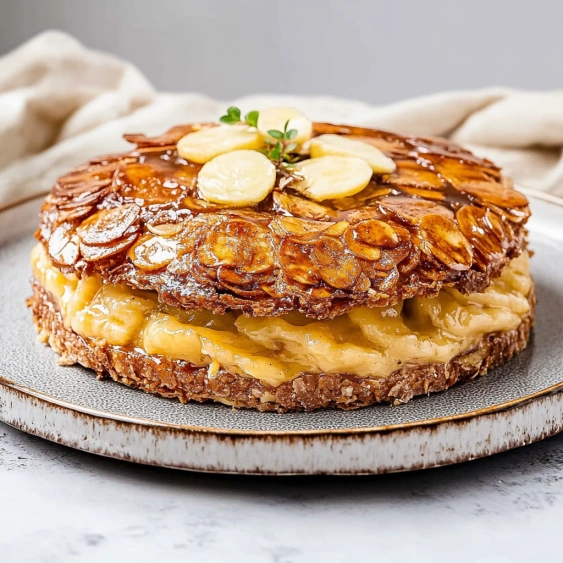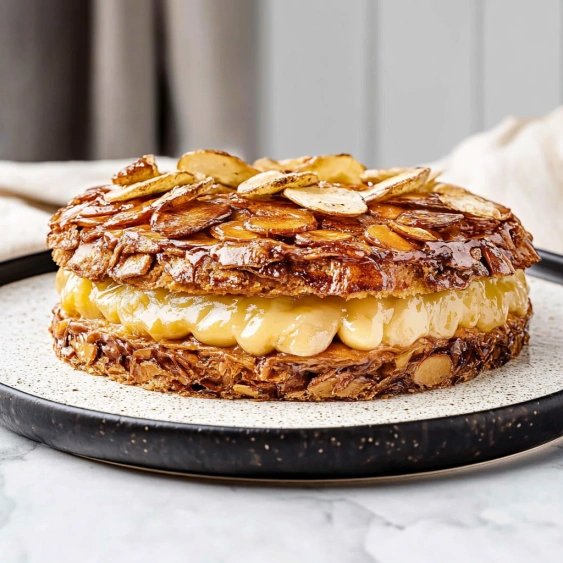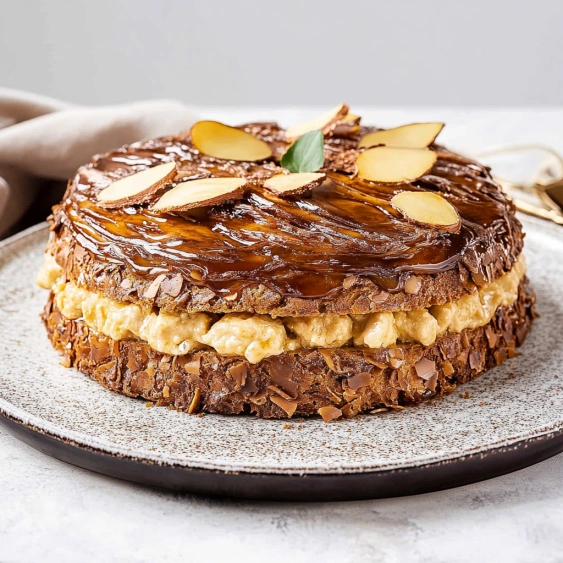 Pin it
Pin it
This traditional German Bee Sting Cake (Bienenstich) brings together a light brioche base, crunchy honey-almond topping, and silky pastry cream filling for a dessert that's impressive yet achievable at home. The contrast between the soft bread, sweet crunchy almonds, and smooth vanilla cream creates a truly unforgettable treat worth the effort.
I first tasted Bienenstich at my grandmother's table during a summer visit to Bavaria. The sensation of biting through that crisp almond layer into the soft bread and creamy filling instantly transported me back to her kitchen every time I make it now.
Ingredients
Brioche Base
- Whole milk: Lukewarm 80g provides the perfect moisture for activating yeast
- Granulated sugar: 37g feeds the yeast and adds subtle sweetness to the bread
- Fresh yeast: 8g or active dry yeast 1 teaspoon gives the signature rise and texture
- Egg: At room temperature adds richness and helps create the brioche texture
- Bread flour: 190g use high protein content flour for proper structure and chew
- Salt: Just a pinch enhances all flavors without making the bread taste salty
- Unsalted butter: 75g at room temperature creates that irresistible brioche richness
Honey Almond Topping
- Granulated sugar: 65g provides sweetness and helps caramelize the topping
- Honey: 60g adds distinctive flavor and helps the almonds stick together
- Unsalted butter: 55g creates richness and helps achieve the perfect texture
- Salt: A large pinch balances the sweetness of the honey and sugar
- Almond flakes: 150g provide the signature crunch and nutty flavor
Pastry Cream Filling
- Whole milk: 480g with 3% fat creates the base for a rich smooth cream
- Granulated sugar: 100g sweetens the filling without making it cloying
- Egg yolks: 80g approximately 4-5 yolks provide richness and thickening power
- Corn starch: 25g helps stabilize the cream for perfect slicing
- All purpose flour: 25g works with the cornstarch for ideal thickness
- Vanilla extract: 2 teaspoons adds warm aromatic flavor that complements the almonds
- Unsalted butter: 55g at room temperature gives the cream a silky finish
Step-by-Step Instructions
- Prepare the Brioche Dough Day 1:
- Warm your milk with half the sugar until just lukewarm, never hot or you'll kill the yeast. Sprinkle yeast over the mixture and wait 10 minutes until it foams which confirms your yeast is active. Place this mixture in your stand mixer with the dough hook and add the eggs mixing to combine completely.
- Add Dry Ingredients:
- Mix in bread flour, the remaining sugar, and salt with the mixer running at medium speed. Allow it to knead for about 3 minutes until the ingredients start coming together into a rough dough. The dough will look shaggy at this point which is perfectly normal.
- Incorporate Butter:
- Add room temperature butter piece by piece while the mixer continues running, waiting until each piece is fully incorporated before adding the next. This slow addition prevents the dough from separating. Once all butter is added, increase to medium-high speed and knead for a full 10 minutes. The dough will transform, becoming glossy, elastic, and pulling away from the sides of the bowl.
- First Rise:
- Transfer the dough to a clean bowl and cover with plastic wrap. Let it rise at room temperature for 1-2 hours until doubled in size. Punch down the dough gently, reshape into a ball, and refrigerate for at least 8 hours or up to 24 hours. This cold fermentation develops flavor and makes the dough easier to handle.
- Prepare for Baking Day 2:
- Grease a 9-inch springform pan thoroughly to prevent sticking. Remove the cold dough from the refrigerator and punch it down to release air bubbles. Roll it out on a lightly floured surface to fit your pan, approximately 9 inches in diameter, then place it into the prepared pan.
- Second Rise:
- Cover the pan with a clean kitchen towel and allow the dough to proof at room temperature for 1-2 hours until it doubles in size and fills the pan. The dough should look puffy, and when gently pressed with a finger, the indentation should slowly spring back.
- Make Almond Topping:
- While the dough proofs, prepare the honey almond topping. Combine sugar, honey, butter, and salt in a small saucepan over medium heat. Cook for 3-4 minutes, stirring constantly, until the mixture thickens slightly – it should coat the back of a spoon. Remove from heat and stir in the almond flakes, ensuring they're completely coated. Allow the mixture to cool to room temperature.
- Bake the Cake:
- Preheat your oven to 180°C/356°F. Once the dough has doubled, carefully spread the almond topping evenly over the surface. Bake for approximately 45 minutes, covering with aluminum foil after 25 minutes to prevent over-browning. The cake is done when golden brown and a toothpick inserted comes out clean. Allow to cool in the pan for 3 minutes, then carefully remove the springform ring and cool completely before filling.
- Prepare Pastry Cream:
- In a large bowl, whisk together sugar and egg yolks for 1-2 minutes until pale and slightly fluffy. Add cornstarch, flour, and vanilla, whisking until completely smooth with no lumps. Heat milk in a saucepan until it just begins to simmer, then remove from heat.
- Create the Custard:
- Pour the hot milk slowly into the egg mixture while whisking vigorously to prevent scrambling the eggs. This is called tempering and ensures a smooth cream. Return the entire mixture to the saucepan and cook over medium heat, stirring constantly, until it thickens – about 1 minute after it begins to bubble. Keep whisking; if lumps form, they will smooth out.
- Finish the Cream:
- Remove from heat and immediately stir in the room temperature butter until completely incorporated and the cream is glossy. Transfer to a shallow bowl and cover the surface directly with plastic wrap to prevent a skin from forming. Allow to cool completely before using.
- Assemble the Cake:
- Once everything has cooled, use a serrated knife to slice the cake horizontally, creating two layers. Fill a piping bag fitted with a star tip with the chilled pastry cream. Pipe the cream evenly over the bottom layer of the cake, then carefully place the top layer with the almond topping over the cream. Dust with powdered sugar just before serving.
 Pin it
Pin it
I always find the honey almond topping to be the most memorable part of this cake. The way it caramelizes during baking creates almost a candy-like texture that contrasts beautifully with the soft brioche. My family fights over the edge pieces where the almonds have become extra crunchy and golden.
Storage Tips
Bee Sting Cake is best enjoyed the day it's assembled, but leftovers can be stored in the refrigerator for up to three days. Keep it in an airtight container to prevent the cake from drying out and the cream from absorbing other flavors. The cake will firm up when cold, so I recommend letting slices sit at room temperature for about 20 minutes before serving for the best texture experience.
The History Behind The Name
The name "Bee Sting" (Bienenstich) supposedly comes from a legend about German bakers who were attacked by bees attracted to the sweet honey topping while they were making this cake. Another version suggests that bakers from one town threw beehives at raiders from a neighboring village, and created this cake to celebrate their victory. Regardless of which story is true, the cake has been a beloved part of German baking tradition for centuries.
Serving Suggestions
For the ultimate German coffee experience, serve slices of Bee Sting Cake alongside a strong cup of coffee in the afternoon – what Germans call "Kaffee und Kuchen" (coffee and cake time). The cake pairs beautifully with unsweetened whipped cream on the side or a scoop of vanilla ice cream for an extra indulgent dessert. For special occasions, add fresh berries around the plate for color and a tart contrast to the sweet cake.
Ingredient Substitutions
If you can't find fresh yeast, active dry yeast works perfectly – just use 1 teaspoon and be sure to let it proof properly. Almond flakes can be replaced with slivered almonds in a pinch, though the texture will be slightly different. For those with dairy sensitivities, plant-based milk and butter alternatives can work in the pastry cream, though the texture may be slightly less rich. Just make sure any butter substitute is suitable for baking.
 Pin it
Pin it
Frequently Asked Questions
- → Why is it called Bee Sting Cake?
The German Bee Sting Cake (Bienenstich) earned its name from the honey-almond topping that attracts bees. Legend says that while baking this cake, a baker was stung by bees attracted to the sweet honey topping. Another story claims that German bakers who successfully defended their town from invaders celebrated by creating this honey-topped cake.
- → Can I make the brioche dough without overnight refrigeration?
While technically possible, the overnight refrigeration (minimum 8 hours) is crucial for developing flavor complexity and proper texture. The slow, cold fermentation allows the yeast to work gradually, creating a more tender, flavorful brioche. For best results, don't skip this step.
- → How do I prevent the almond topping from burning?
Monitor the cake carefully during baking and cover the top with aluminum foil after about 25 minutes, or when you notice the almonds turning golden brown. The honey in the topping caramelizes quickly, so protecting it with foil prevents burning while allowing the cake to finish baking properly.
- → Can I prepare components ahead of time?
Yes! The brioche dough needs refrigeration anyway (up to 24 hours), and the pastry cream can be made a day ahead and stored covered in the refrigerator. The almond topping is best made shortly before baking for the proper consistency, though you can measure ingredients ahead of time.
- → What's the best way to slice the cake horizontally?
Wait until the cake is completely cooled. Use a long serrated knife and make a small mark around the perimeter at your desired height. Then, keeping the knife level, use a gentle sawing motion while slowly rotating the cake. Some bakers use dental floss or a cake leveler for cleaner cuts.
- → Why did my pastry cream become lumpy?
Lumps can form if the hot milk is added too quickly to the egg mixture or if the mixture isn't whisked continuously during cooking. If lumps form, keep whisking vigorously—most will smooth out. For stubborn lumps, strain the cream through a fine-mesh sieve before cooling.
